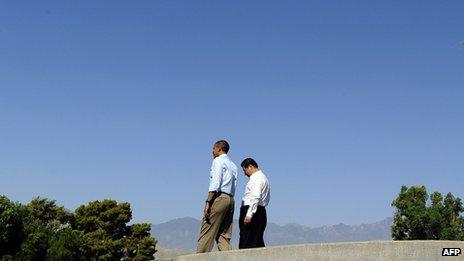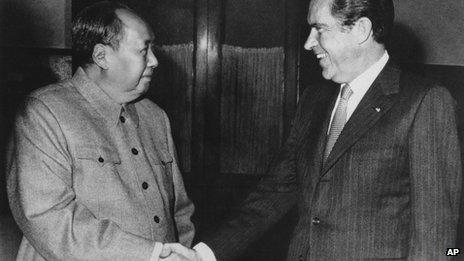Obama-Xi: US and Chinese media on talks
- Published

US President Barack Obama and Chinese leader Xi Jinping have ended a two-day summit described by a US official as "unique, positive and constructive".
Leading US and English-language Chinese newspaper websites have been assessing the impact of the historic talks, held in California on Friday and Saturday.
Below is a selection of their reporting of the summit.
US media
Under the headline, "Obama and Xi try building a new model for US-China ties", the New York Times, external says that "for all the advance talk of the informality of the meetings" the two leaders "largely followed well-established diplomatic routine" with spontaneity limited by the "necessary translations".
The Times says there was progress in a number of areas of mutual concern, but a familiar sticking point remained.
"Even as they pledged to build "a new model" of relations, President Obama and President Xi Jinping of China ended two days of informal meetings here on Saturday moving closer on pressuring a nuclear North Korea and addressing climate change, but remaining sharply divided over cyber-espionage and other issues that have divided the countries for years."
The Washington Post, external leads its main report on what it describes as a "high-stakes and unusual summit", with the issue of cyber attacks.
"President Obama confronted Chinese President Xi Jinping here Saturday with specific evidence of China's widespread theft of intellectual property from US companies and warned the newly minted Chinese leader that continued cybertheft would undermine economic ties between the rival nations..." the paper says.
The LA Times, external highlights the US president's own, brief, assessment of the talks: "Obama gave a one-word summary of the summit Saturday, his only public comment of the day.
"'Terrific,'" he replied when a reporter asked how the meetings had gone, as he and Xi strolled for 50 minutes by a pond and then sat together on a redwood bench that Obama presented to his guest."
In common with others, the paper also focuses on a summit "notable for its dress code".
"No one wore neckties, a testament to the oven-like heat and carefully scripted informality of the presidents' first meeting since Xi assumed office in March," the LA Times says.
"Some China watchers and historians say they were struck by how Xi seemed to move comfortably like a Western leader, not only in loosening his collar but also in how he seemed to stroll at ease with Obama as the two leaders engaged with each other."
The two leaders agreed to "co-operate" on North Korea
Meanwhile, NBC News, external reports that the two-day talks were "said to have been a warm and laid-back counterpoint to the oftentimes frigid and tense relationship between the two global superpowers".
In an article published ahead of the talks, the Wall Street Journal, external notes that "Mr Xi pushed for the summit and agreed to the informal format despite Chinese leaders' usual preference for highly scripted talking points approved in advance by China's top decision-making body, the Politburo Standing Committee".
"Mr Xi himself drew parallels with the 1972 meeting between Chairman Mao Zedong and President Richard Nixon in Beijing, which laid the ground for the normalization of relations six years later," the paper adds.
Chinese media
The Xinhua, external news agency leads its coverage with views on the talks from Yang Jiechi, Mr Xi's senior foreign policy advisor, who focused on the changing relationship between the two powers.
According to Mr Yang, "Xi summarized the concept of new type relations between the two nations in three phrases: 'no conflict and no confrontation', 'mutual respect' and 'cooperation toward win-win results'.
The paper added, again quoting Mr Yang, that: "Obama responded actively to the proposal, saying that the US side placed high importance on its relations with China and is willing to construct a new state-to-state cooperation modal with China based on mutual benefit and mutual respect, so as to jointly meet various global challenges."
The South China Morning Post, external has a slightly different take to the US media on the subject of cyber-espionage.
It says: "Obama, facing pressure from US politicians and businessmen, said he discussed cybersecurity with Xi, but the two sides avoided a direct public confrontation on the issue."
Elsewhere, the paper notes: "Observers said the initial talks suggested the leaders had made a decent start on fostering a personal relationship, but both sides still needed time to figure out their "new model" of relations."
The Global Times, external highlighted comments from Mr Xi on Friday where he said he "elaborated the Chinese dream to Obama".

Nixon's 1972 trip to China was the first visit by a US president
Global Times quotes the Chinese president as saying: "Through the Chinese dream, we seek to have economic prosperity, national renewal and the people's well-being. The Chinese dream is about peace, development, cooperation and win-win results, and it is connected to the American dream and beautiful dreams of people in other countries."
The People's Daily, external recalls the "historic handshake across the Pacific" between US President Nixon and Chairman Mao in Beijing in 1972.
"While there have been ups and downs over the four decades that have elapsed since the Mao-Nixon meeting, fundamental changes have added impetus to the development of Sino-US relations, turning from 'external demand' to 'domestic demand'", the paper says.
"At the time of their mutual opposition to the Soviet threat, the forces that drove China and the United States closer to each other were passive. Today, as ties between the two countries grow, the impetus behind their rapprochement is an active and sober call from the heart."
"Asia has become one of the centres of his [President Obama's] new blueprint, and China happens to be the biggest nation in this region. How to get along with China? This is a question that will put the United States to the test."
- Published9 June 2013